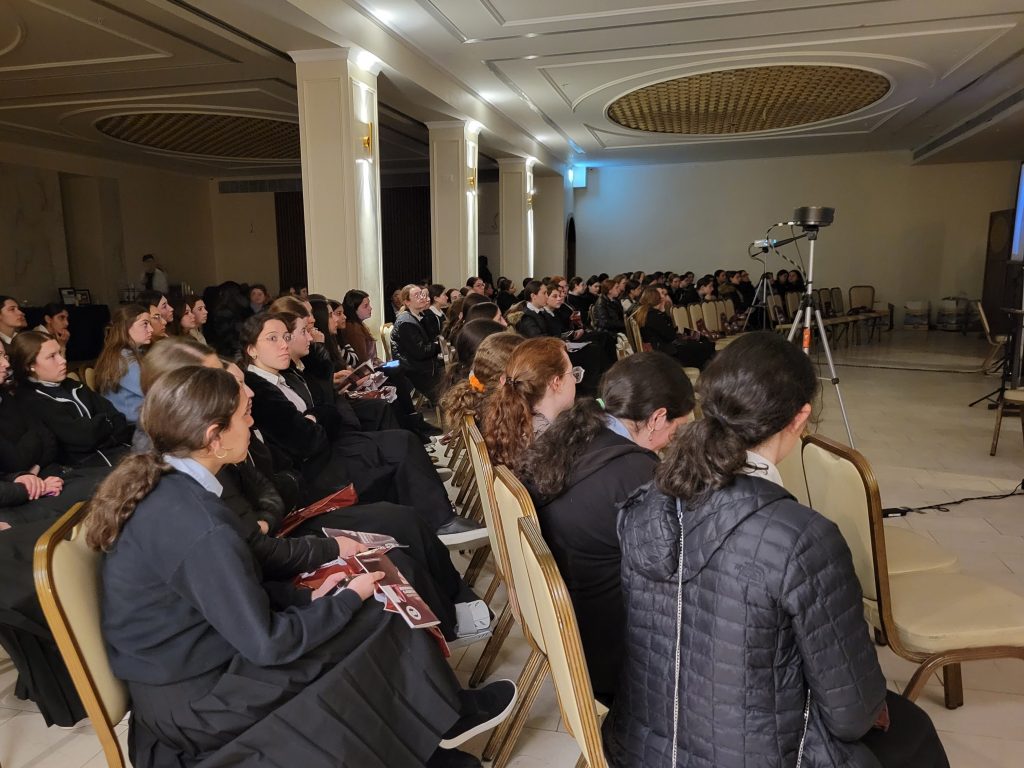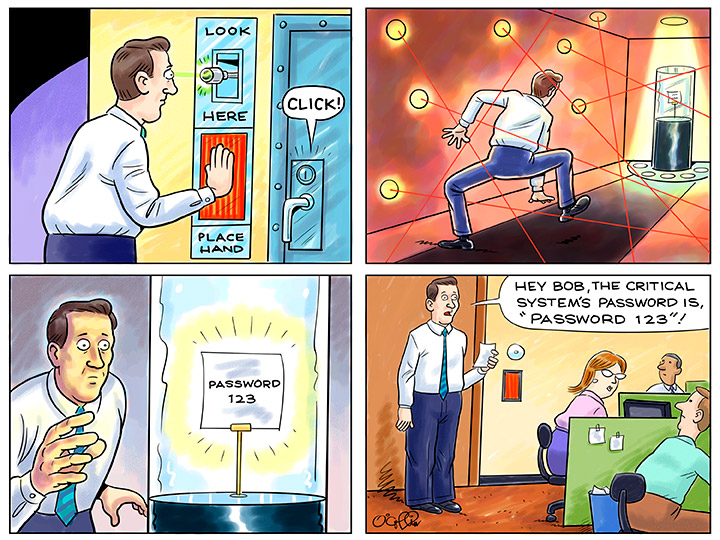The Katz School of Science and Health Master of Science in Cybersecurity is a unique and rigorous graduate program designed to help you enter the exciting and lucrative field of cybersecurity. Through this 30-credit master’s degree, you will develop the technological and managerial expertise to plan, implement, manage, support, monitor, and audit the cybersecurity posture of Information Technology infrastructure in modern organizations. You will master state-of-the-art technologies and practices, and receive hands-on experience including threat mitigation, detection, and defense.
Cybersecurity analysts plan and carry out security measures to protect a company’s computer networks and systems. They keep constant tabs on threats and monitor their organization’s networks for any breaches in security. A typical cybersecurity analyst job description includes installing, configuring, managing, and supporting various cybersecurity tools including but not limited to firewalls, data leakage protection, anti-virus, end-point protection, encryption tools, identifying vulnerabilities, reporting breaches or weak spots, researching IT trends, educating the rest of the company on security—and even simulating security attacks to find potential vulnerabilities.
According to the US Bureau of Labor Statistics, the employment of information security analysts is projected to grow 31 percent from 2019 to 2029, much faster than the average for all occupations. See here for a heat map of cybersecurity jobs.
Demand for information security analysts is expected to be very high. Cyberattacks have grown in frequency, and analysts will be needed to come up with innovative solutions to prevent hackers from stealing critical information or creating problems for computer networks.
Partner college(s):

Program Location(s):
- Live Online
FAQ
We are proud to have partnered with Katz School of Science and Health, which features one of the premier cybersecurity programs in the country. As part of Yeshiva University, a US News and World Report Top 100 University, and among Forbes Magazine’s highest-ranked research institutes, the Katz School is an academic powerhouse.
Recognized industry certifications are key to getting the best jobs. Katz School cybersecurity students are expected to be prepared to sit for core industry certifications:
- CISSP – Certified Information Systems Security Professional
- CSSK – Certificate of Cloud Security Knowledge
Certified Information Systems Security Professional (CISSP) is the leading cybersecurity and IT security certifications, granted by the International Information System Security Certification Consortium (ISC). MS in Cybersecurity students are prepared to take the CISSP exam after their first semester Cybersecurity Foundations course. CISSP confirms that cybersecurity professionals have the necessary skills to perform security functions and to pursue an advanced career in IT security. (ISC) supports those who hold the certification with exclusive resources, educational tools, and peer-to-peer networking opportunities.
Cybersecurity analysts plan and carry out security measures to protect a company’s computer networks and systems. They keep constant tabs on threats and monitor their organization’s networks for any breaches in security. A typical cybersecurity analyst job description includes installing, configuring, managing, and supporting various cybersecurity tools including but not limited to firewalls, data leakage protection, anti-virus, end-point protection, encryption tools, identifying vulnerabilities, reporting breaches or weak spots, researching IT trends, educating the rest of the company on security—and even simulating security attacks to find potential vulnerabilities.
Cybersecurity analysts will also plan for malicious activities, develop incident response playbooks, and create contingency plans that the company will implement in case of a compromised company IT infrastructure and critical assets. Since cyber attackers are constantly using new tools and strategies, cybersecurity analysts need to stay informed about the emerging security threats to mount a strong defense. Additionally, information security professionals may assist in educating and informing members of an organization about security risks and best practices to protect company resources. Even the most technically sound and secure systems can be compromised by a malicious user.
According to the US Bureau of Labor Statistics, employment of information security analysts is projected to grow 31 percent from 2019 to 2029, much faster than the average for all occupations.
Demand for information security analysts is expected to be very high. Cyberattacks have grown in frequency, and analysts will be needed to come up with innovative solutions to prevent hackers from stealing critical information or creating problems for computer networks. See here for a heat map of cybersecurity jobs.
- Bachelor’s degree from an accredited institution (Yeshiva degree- BTL is accepted)
- Minimum undergraduate 3.0 GPA
This program is offered entirely live-online.
There are ten courses in the program, and students take two courses per semester. Each course meets one evening each week for twelve weeks.
- Evening courses, so you can work full-time while completing your degree
- Top-notch industry faculty who know every student by name
- Career support and professional networking opportunities
- Opportunities to gain industry experience through internships and fieldwork
The cost for the 10-course master’s degree is $28,000 (including tech fees).
At the graduate level, financial aid is available in the form of loans that can cover the full cost of the degree. Graduate students may borrow up to $20,500 per year through the federal unsubsidized direct loan program. After the origination fee, the remaining balance due can be paid by semester or on a monthly payment plan. Katz School offers a ten-month payment-plan option as well.
The Free Application for Federal Student Aid (FAFSA) can be completed online at this link. Katz School’s FAFSA school code is 002903. Be sure to complete the correct year’s application.
Katz School offers a ten-month payment-plan option as well.
Additionally, there are a number of scholarships open to Jewish graduate students for which we encourage you to apply:
Helen B and Lewis E Goldstein Scholarship Fund – The Helen B and Lewis E Goldstein Scholarship Fund is open to Jewish full-time students enrolled in an accredited undergraduate or graduate school in the United States.
Rose Biller Scholarship Fund – The Rose Biller Scholarship Fund is open to Jewish residents of NYC’s five boroughs, Westchester, and Long Island with financial need. It provides scholarships to Jewish men and women with significant economic need attending undergraduate, graduate, and professional schools.
Samuel Lemberg Scholarship Loan Fund – The Samuel Lemberg Scholarship Loan Fund provides interest-free loans to aid Jewish undergraduate and graduate college students who exhibit exceptional academic achievement and face financial difficulties pursuing a higher education. These loans must be repaid within ten years of graduation or termination of studies.
To get more information on these scholarships, please reach out to each organization directly. Please check scholarship websites for availability and deadlines. Most scholarships are not available every semester.
To request an application, please submit this form.
When completing the application, you will also be requested to supply:
- Undergraduate Transcript(s)
- Current Resume
- Letter of Recommendation
- Personal Statement
- Personal Photograph
- Non-refundable application fee
Even if you do not have these available at the time of application, we recommend submitting your application immediately and the required documentation as they become available.
Once your application is submitted with all the required documents, an interview will be scheduled to continue the admissions process.
If you have additional questions or concerns, please feel free to call our office at 718-633-8557 ext. 40 or email [email protected], and as always, we will be happy to assist you further.
Course Listing
CYB 5000
Cybersecurity Foundations
CYB 5100
CYB 5200
Network, Data and Communications Security
CYB 5300
Risk Management and Cybersecurity
CYB 5400
Cybersecurity Audit, Assessment, and Training (Cloud Security)
TMG 5500
Leading Technology Organizations
CYB 7992
E-Discovery, Digital Evidence & Computer Forensics
CYB 6500
Cybersecurity Capstone
CYB 5600
Emerging Cybersecurity Threats
CYB 6300
Cybercrime, Cyberwar, and Threat Actors







